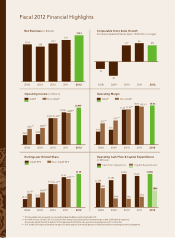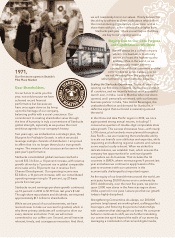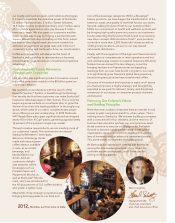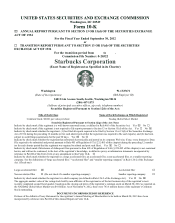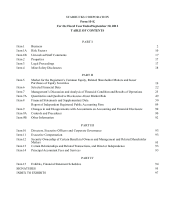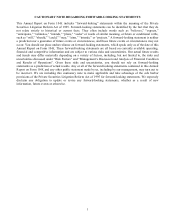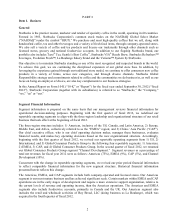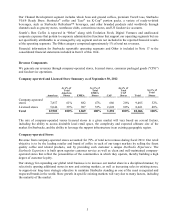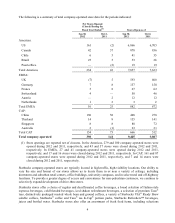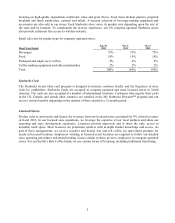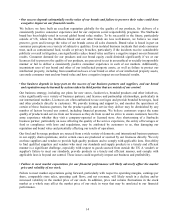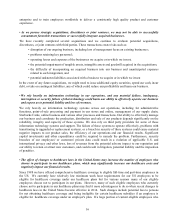Starbucks 2012 Annual Report Download - page 12
Download and view the complete annual report
Please find page 12 of the 2012 Starbucks annual report below. You can navigate through the pages in the report by either clicking on the pages listed below, or by using the keyword search tool below to find specific information within the annual report.
6
Starbucks total licensed stores by country as of September 30, 2012 are as follows:
Americas Europe/Middle East/Africa China / Asia Pacific
US 4,262 Turkey 171 Japan 965
Mexico 356 UK 168 South Korea 467
Canada 303 United Arab Emirates 99 China 292
Other 125 Spain 78 Taiwan 271
Kuwait 65 Philippines 201
Saudi Arabia 64 Malaysia 134
Russia 60 Indonesia 133
Greece 42 Hong Kong 131
Other 240 New Zealand 34
Total 5,046 Total 987 Total 2,628
In the Americas, 351 and 296 licensed stores were opened during 2012 and 2011, respectively, and 81 and 564
licensed stores were closed during 2012 and 20 11, respectively. The 564 licensed stores that were closed in the
Americas during fiscal 2011 include 475 Seattle’s Best Coffee locations in Borders Bookstores. In EMEA, 139
and 111 licensed stores were opened during 2012 and 2011, respectively, and 38 and 32 licensed stores were
closed during 2012 and 2011, respectively. In CAP, 354 and 264 licensed stores were opened during 2012 and
2011, respectively, and 60 and 71 licensed stores were closed during 2012 and 2011, respectively.
Consumer Packaged Goods
Consumer packaged goods includes both domestic and international sales of packaged coffee and tea as well as
a variety of ready-to-drink beverages and single-serve coffee and tea products to grocery, warehouse club and
specialty retail stores. It also includes revenues from product sales to and licensing revenues from manufacturers
that produce and market Starbucks and Seattle’s Best Coffee branded products through licensing agreements.
Revenues from sales of consumer packaged goods comprised 8% of total net revenues in fiscal 2012.
Foodservice
Revenues from foodservice accounts comprised 4% of total net revenues in fiscal 2012. We sell Starbucks®and
Seattle’s Best Coffee®whole bean and ground coffees, a selection of premium Tazo®teas, Starbucks VIA®
Ready Brew, and other coffee and tea related products to institutional foodservice companies that service
business and industry, education, healthcare, office coffee distributors, hotels, restaurants, airlines and other
retailers. We also sell our Seattle’s Best Coffee®through arrangements with national accounts. The majority of
the sales in this channel come through national broadline distribution networks with SYSCO Corporation, US
Foodservice™, and other distributors.
Product Supply
Starbucks is committed to selling only the finest whole bean coffees and coffee beverages. To ensure
compliance with our rigorous coffee standards, we control coffee purchasing, roasting and packaging, and the
global distribution of coffee used in our operations. We purchase green coffee beans from multiple coffee-
producing regions around the world and custom roast them to our exacting standards, for our many blends and
single origin coffees.
The price of coffee is subject to significant volatility. Although most coffee trades in the commodity market,
high-altitude arabica coffee of the quality sought by Starbucks tends to trade on a negotiated basis at a premium


